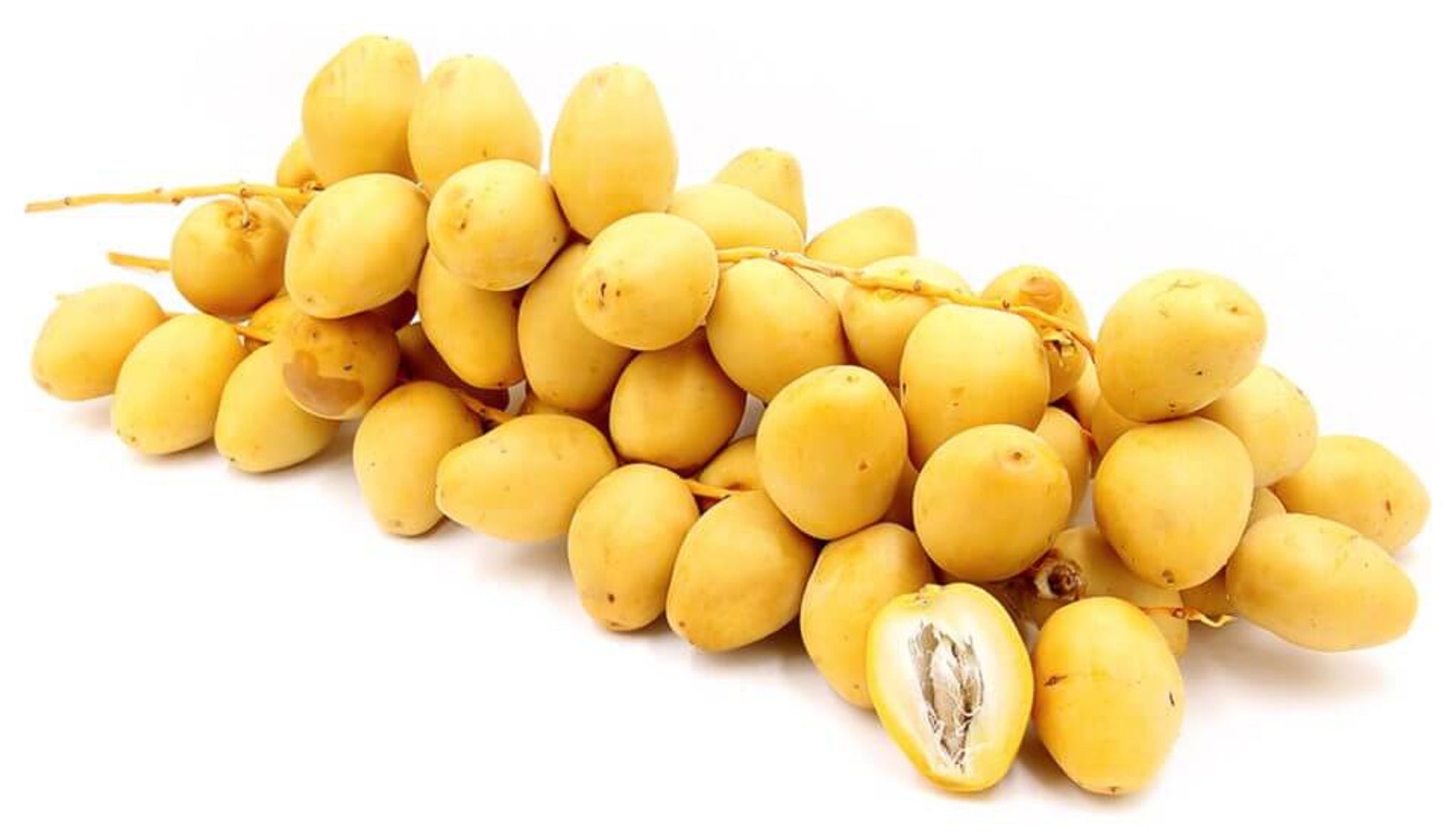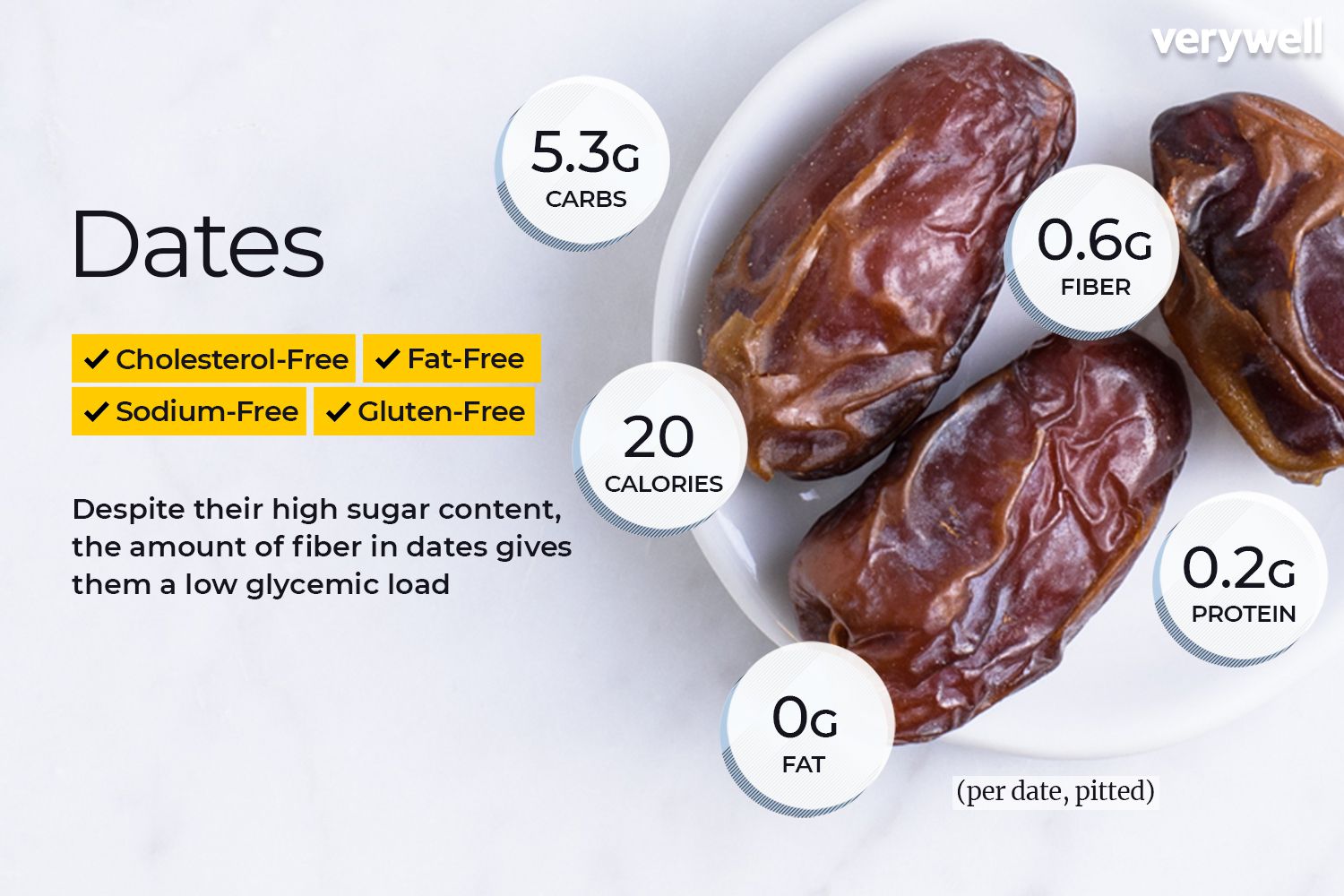Fresh Dates
- Product Weight: 454 g
- Category: Fresh Fruits & Vegetables, Grocery & Gourmet Foods, Vegetables

Dates are one of nature's sweetest treats. Their high sugar content may have you wondering whether dates are considered a healthy choice. Dates are definitely sweet, but as a fruit, they also provide beneficial micronutrients and some fiber. You may want to consume dates in moderation, but they are by no means an empty-calorie food. Here's what we love about them.
Date Nutrition Facts
The USDA provides the following nutrition information for one date (7 grams):
- Calories: 20
- Fat: 0g
- Sodium: 0.14mg
- Carbohydrates: 5.3g
- Fiber: 0.6g
- Sugars: 4g
- Protein: 0.2g
Carbs
One date has a little over 5 grams of carbohydrates, the majority of which come from sugar. Furthermore, dates taste so sweet because they have a high fructose content, which is twice as sweet as glucose. There is about half a gram of fiber in an average date. The sugar content increases and fiber decreases as the fruit ripens.
The glycemic index of dates can range between 43 and 55 depending on the variety and level of ripeness. Despite their sweetness, dates are, surprisingly, a low glycemic food.
Fat
Dates are not a significant source of fat.
Protein
Dates supply a minimal amount of protein. Include other protein sources, like lean meats, fish, nuts, seeds, and legumes, to meet your daily requirements.
Vitamins and Minerals
Dates are a good source of potassium, magnesium, and iron. Also, dates supply six essential B vitamins, including folate and pantothenic acid. Dates also have a high concentration of polyphenols, a type of antioxidant that protects against cellular damage, along with beneficial phytoestrogens.3
Health Benefits
The micronutrients and plant compounds in dates are associated with several promising health benefits.
Protect Against Cancer
Dates contain antioxidant and anti-inflammatory properties that are associated with cancer prevention. Upon testing date extract, researchers have found impressive free-radical scavenging ability and antitumoral activity.4
Support Heart Health
Dates provide potassium, an essential electrolyte for the cardiovascular system. Potassium has well-established effects on reducing high blood pressure. Dates are also very low in sodium and provide some fiber.5 All three of these factors support the consumption of dates for heart health.
Promote Strong Bones
The magnesium in dates is involved with bone formation. Magnesium deficiency is associated with a higher risk of osteoporosis.6 Obtaining magnesium from food sources, rather than from supplements, is preferred as it reduces the risk of toxicity. Furthermore, the iron from dates helps supply healthy bone marrow stores.7
May Reduce Menopausal Symptoms
Isoflavones, commonly associated with soy products, are a type of phytoestrogen that helps reduce the unpleasant symptoms of menopause. When it comes to fruit, dates have the highest concentration of isoflavones.
For this reason, dates are being studied for their ability to provide natural relief from menopausal symptoms.3
Help Stabilize Blood Sugars
With dates, a small amount can go a long way. When used in place of concentrated sweeteners, like syrups and refined sugars, dates impart sweetness without producing significant spikes in blood sugar levels.8 Dates are also a convenient, portable snack that can be useful for low blood sugar episodes.
Dates are one of nature's sweetest treats. Their high sugar content may have you wondering whether dates are considered a healthy choice. Dates are definitely sweet, but as a fruit, they also provide beneficial micronutrients and some fiber. You may want to consume dates in moderation, but they are by no means an empty-calorie food. Here's what we love about them.
Date Nutrition Facts
The USDA provides the following nutrition information for one date (7 grams):
- Calories: 20
- Fat: 0g
- Sodium: 0.14mg
- Carbohydrates: 5.3g
- Fiber: 0.6g
- Sugars: 4g
- Protein: 0.2g
Carbs
One date has a little over 5 grams of carbohydrates, the majority of which come from sugar. Furthermore, dates taste so sweet because they have a high fructose content, which is twice as sweet as glucose. There is about half a gram of fiber in an average date. The sugar content increases and fiber decreases as the fruit ripens.
The glycemic index of dates can range between 43 and 55 depending on the variety and level of ripeness. Despite their sweetness, dates are, surprisingly, a low glycemic food.
Fat
Dates are not a significant source of fat.
Protein
Dates supply a minimal amount of protein. Include other protein sources, like lean meats, fish, nuts, seeds, and legumes, to meet your daily requirements.
Vitamins and Minerals
Dates are a good source of potassium, magnesium, and iron. Also, dates supply six essential B vitamins, including folate and pantothenic acid. Dates also have a high concentration of polyphenols, a type of antioxidant that protects against cellular damage, along with beneficial phytoestrogens.3
Health Benefits
The micronutrients and plant compounds in dates are associated with several promising health benefits.
Protect Against Cancer
Dates contain antioxidant and anti-inflammatory properties that are associated with cancer prevention. Upon testing date extract, researchers have found impressive free-radical scavenging ability and antitumoral activity.4
Support Heart Health
Dates provide potassium, an essential electrolyte for the cardiovascular system. Potassium has well-established effects on reducing high blood pressure. Dates are also very low in sodium and provide some fiber.5 All three of these factors support the consumption of dates for heart health.
Promote Strong Bones
The magnesium in dates is involved with bone formation. Magnesium deficiency is associated with a higher risk of osteoporosis.6 Obtaining magnesium from food sources, rather than from supplements, is preferred as it reduces the risk of toxicity. Furthermore, the iron from dates helps supply healthy bone marrow stores.7
May Reduce Menopausal Symptoms
Isoflavones, commonly associated with soy products, are a type of phytoestrogen that helps reduce the unpleasant symptoms of menopause. When it comes to fruit, dates have the highest concentration of isoflavones.
For this reason, dates are being studied for their ability to provide natural relief from menopausal symptoms.3
Help Stabilize Blood Sugars
With dates, a small amount can go a long way. When used in place of concentrated sweeteners, like syrups and refined sugars, dates impart sweetness without producing significant spikes in blood sugar levels.8 Dates are also a convenient, portable snack that can be useful for low blood sugar episodes.


































